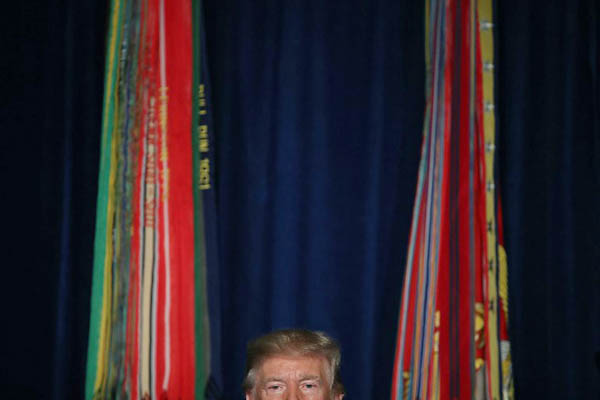
Mark Wilson-Getty Images North America—AFP
Instead of reacting in anger to Donald Trump’s rhetoric, Islamabad must continue the Pakistan Army’s mission to rid its territory of extremists
After having threatened a radical closure of America’s longest foreign war, President Donald Trump has listened to moderate advice and extended Washington’s current Afghan policy while putting Pakistan on notice for offering sanctuary to terrorists staging attacks within Afghanistan. In a formal address to the nation, he also asked India to take on more of the financial burden of reconstructing Afghanistan, subliminally desiring more Indian covert military involvement too.
Pakistani commentators have taken Trump’s message as a challenge and are invoking a Cold War-like confrontation between the U.S. and China with Pakistan safely operating on the Chinese side as India draws closer to the U.S. This would be a mistake, above all because China wouldn’t like it: it doesn’t challenge; it trades and for that it abhors conflict. The Pakistan Army has behaved correctly on Afghanistan, with Army chief General Qamar Javed Bajwa sending out a supportive message to Kabul every time the Taliban attack and kill American soldiers. The military’s public relations arm, the Inter-Services Public Relations (ISPR), in its latest statement also assured Kabul that all terrorist sanctuaries, including those of the Haqqani Network, have been destroyed and that Pakistan is working to secure the Pak-Afghan border against infiltration.
With its economy rapidly sagging and political instability challenging its institutions, Pakistan needs to be realistic. The 2008 Mumbai attack issue remains unresolved and Islamabad continues to prevent the U.N. from subjecting its main accused, Hafiz Saeed, to trial. On June 13, a U.S. drone attack in district Hangu of Khyber-Pakhtunkhwa province killed commander Abu Bakr Haqqani of the Haqqani Network, prompting U.S. Secretary of State Rex Tillerson to threaten review of U.S. military funding to Pakistan. In February 2016, U.S. drones killed five Haqqani Network terrorists, again in Hangu.
Three years earlier, in 2013, U.S. drones had killed a commander of the Network in Hangu after his arrest and release by Pakistan in 2010 along with other senior members of the infamous Quetta Shura of the Afghan Taliban. According to reports, terrorists supported by New Delhi and Kabul have now penetrated into Pakistan. Iran, too, has been allowed to send troops in the north of Afghanistan to fend off Taliban attacks.
Pakistan must not accept President Trump’s latest policy statement as a challenge. It must cooperate in all efforts to end terrorist attacks in Afghanistan and on its own territory. Above all, it must steadily continue the Pakistan Army’s current campaign to bring all the country’s territory under normal control.
